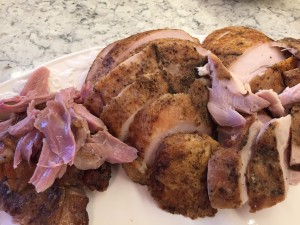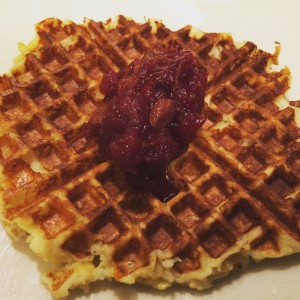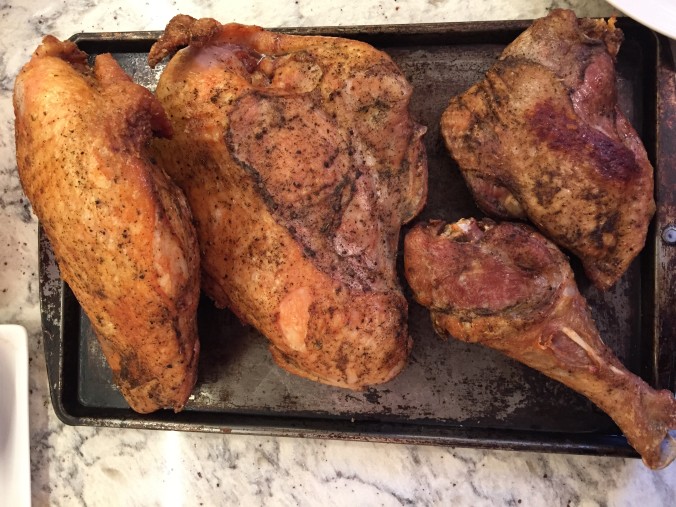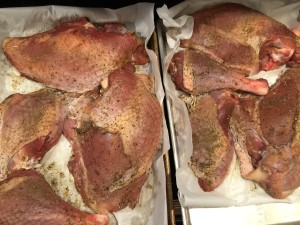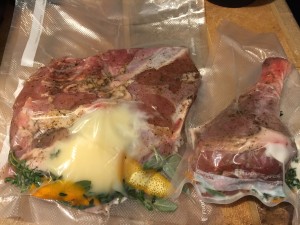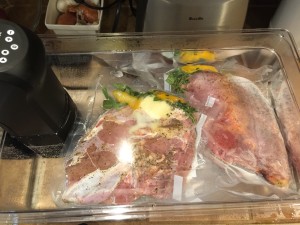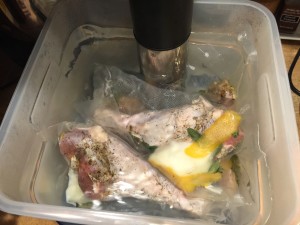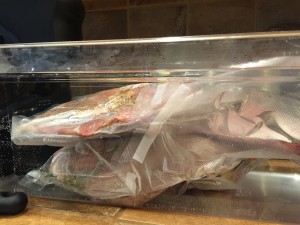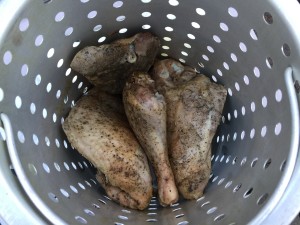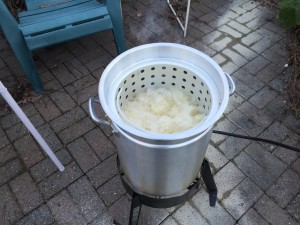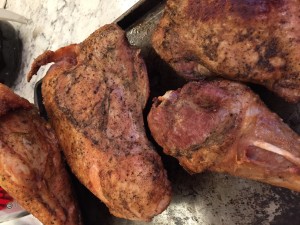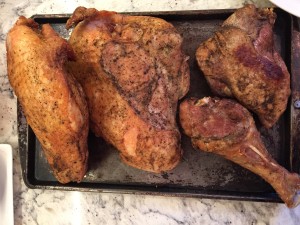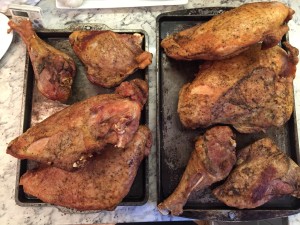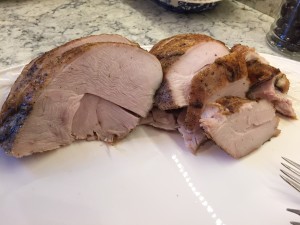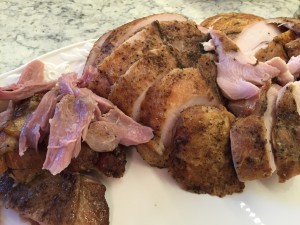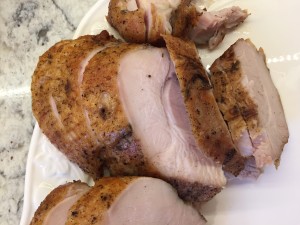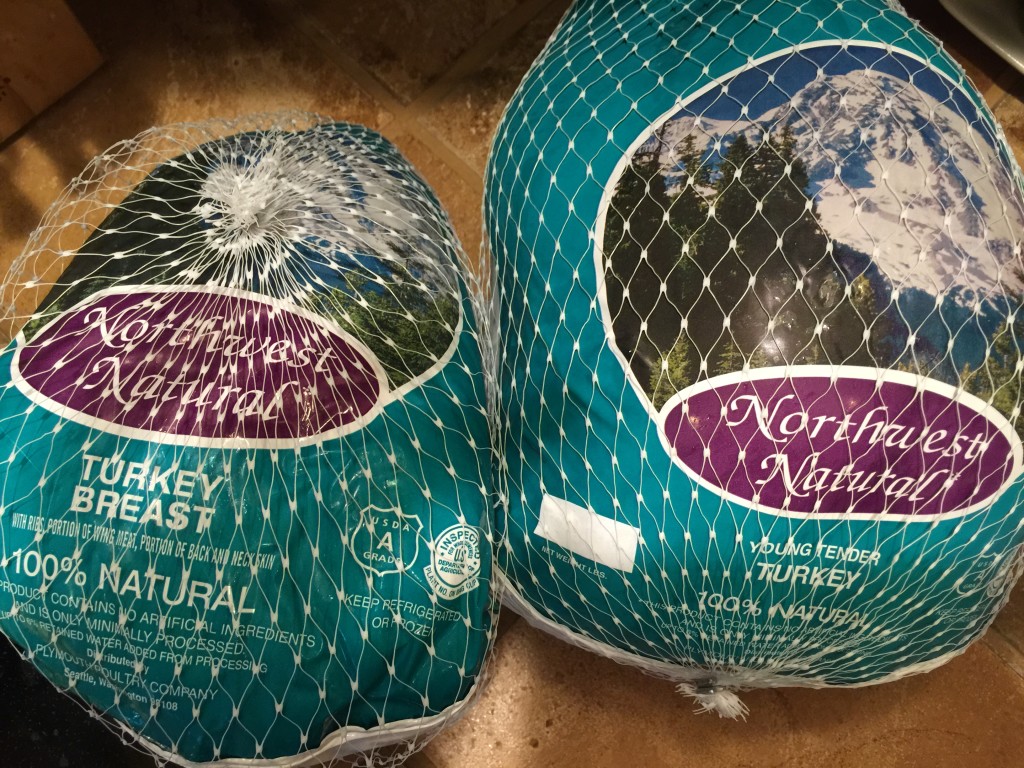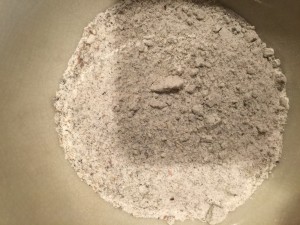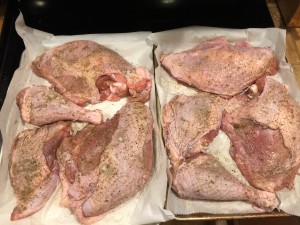Dry Brined, Sous Vide, Deep Fried Turkey Recipe
Adapted from recipes by Alton Brown and Michael Voltaggio.
Recipe for a ~14 pound turkey. Scale as necessary if adding additional turkeys or turkey parts.
Dry Brine ingredients (via Alton Brown):
- 3 1/2 tbsp kosher salt
- 1/ 1/2 tsp rubbed sage
- 1 1/2 tsp dried thyme
- 1 1/4 tsp whole black peppercorns
- 1/2 tsp whole allspice berries
Turkey
- ~14 pound turkey
- 1 1/2 cups duck fat
- 6 large slices of orange peel, from 1 – 2 oranges
- 6 sprigs fresh thyme
- 6 sprigs fresh sage leaves
- Oil for deep frying (~6 gallons)
Equipment
- Spice Grinder or mortar and pestle
- Sous vide setup – immersion circulator and bath or other home made solution
- Vacuum sealer and bags or large ziploc bags
- Turkey Fryer or other deep fryer
4 to 5 days before serving
Combine all dry brine ingredients in a spice grinder or mortar and grind into a coarse powder. Set aside.
Disassemble the turkey into individual parts. If you’re unfamiliar with the process, a good video can be found here. Reserve wings and back for making turkey stock or gravy.
Arrange the breasts, thighs, and legs on two parchment paper lined sheet pans, leaving some space between each piece, and thoroughly dust each piece on both sides with the dry brine mixture. Store in the refrigerator, uncovered, for 4 days.
Day before or day of serving
Setup your sous vide rig to cook at 150F/65.5C.
Remove the dry brined turkey parts from the refrigerator. Place each turkey piece in a vacuum seal bag, along with 1/4cup of duck fat, 1 strip of orange peel, 1 sprig of thyme, and 1 sprig of sage leaves. Seal with a vacuum sealer. Place the breasts and legs back in the refrigerator.
- If using ziploc bags instead of vacuum seal bags, use the water displacement method to remove air from the bags before cooking. To do this, seal the bag most of the way, then push the bag underwater until all but the seal is submerged. This will force out almost all of the air. Completely seal the bag.
When your water bath has come up to temperature, place the bagged thighs in the water and set a timer for 30 minutes. After 30 minutes, retrieve the breasts and legs from the fridge and place them in the bath. Cook submerged for an additional 2 hours – 2 1/2 hours total for the thighs, 2 hours for the breasts and legs.
- If you are doing this step the day before serving, remove the bags from the sous vide bath and place in a bowl of iced water to chill for 10-20 minutes, then move the still bagged pieces to the fridge. 2 hours before serving, reheat the water bath to 150F/65.5C and reheat for 60 minutes.
About 70 minutes before serving, preheat the fryer oil in your fryer to 375F. This takes around 30 minutes. WARNING: deep fryers can be dangerous. Never leave one alone while it is heating or cooking. Recruit someone to watch your fryer while you finish prepping the turkey. Please consult your fryers manual for instructions on how to safely use it.
While the fryer is coming to temp, remove the turkey pieces from their bags and place on a paper towel lined sheet pan. Pat dry and remove any aromatics that are stuck to the meat.
When the fryer is at 375F, working in two batches, fry the turkey pieces for 4-7 minutes until the skin is golden brown and crispy. Evacuate the fried pieces to a clean sheet pan to rest for 20 – 30 minutes. After the first batch, let the oil return to 375F before frying the second batch.
- I like to use the basket insert for my turkey fryer for this step. I put half of the turkey pieces in the basket, and SLOWLY lower it into the oil using the supplied hook. I start checking for doneness after about 3 minutes. When done, I remove the basket with the hook, let it drain for a few seconds back into the fryer, then move it to another sheet pan setup to catch any drips while I removes the turkey pieces. Reload the basket with the rest of the turkey, and repeat.
After the turkey has rested, carve as desired and serve.
Sous Vide Cranberry Sauce with Ginger and Orange
Ingredients
- 1 package (~12oz) fresh cranberries
- 1 cup sugar
- 1 medium fresh ginger root
- Zest of 1 medium orange
Equipment
- Sous vide setup – immersion circulator and bath or other home made solution
- Vacuum sealer and bags or large ziploc bags
Setup sous vide rig to cook at 185F/85C.
Peel ginger root using a spoon. Slice half of the ginger root until 1/4 inch rounds, and grate the other half using a microplane or other fine grater.
Place the cranberries, sliced and grated ginger, orange zest, and sugar in a vacuum seal bag and seal.
When the water bath reaches 185F/85C, put the cranberries in the water and place a dinner plate or other water safe weight on top of the bag to keep it submerged. Cook for 1 hour.
- This can be done a few days in advance. If done in advance, take the cooked cranberries and dunk in an ice bath for 5-10 minutes to chill, then place in the refrigerator until ready to serve.
15 minutes before serving, pour the cranberries and their liquid into a small saucepan over medium heat. Gently stir every few minutes until the sauce has thickened to your desired consistency. Pour into a bowl and serve.
Leftover Mashed Potato Waffles
Ingredients
- 2 cups leftover mashed potatoes
- 1/2 cup grated cheese (I like sharp cheddar, but anything that melts decently and you have on hand will work)
- 1/3 cup flour
- 1 egg
- Optional:
- chopped turkey, bacon, crumbled sausage, or any other meat you’d like to experiment with
- leftover stuffing (replace 1:1 for some of the potatoes)
- Cranberry Sauce, gravy, syrup (for topping)
Equipment
- Waffle Iron
- Non-stick Spray
Mix all ingredients (except toppings) in a medium bowl until well combined and the mixture is the consistency of a thick cupcake or muffin batter.
Set your waffle iron to a medium setting. When it is preheated, give both sides a quick shot of non-stick spray, and place on a scoop of the potato mixture. Close the lid and cook for 4-5 minutes, or until your waffle maker signals it has finished. Waffle should be golden brown and crispy.
Serve with cranberry sauce, gravy, or maple syrup.
